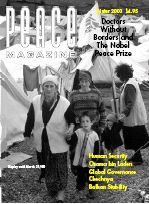
Peace Magazine Winter 2000, page 6. Some rights reserved.
Search for other articles by Michael Schull here
The recent Nobel Peace Prize awarded to Doctors Without Borders/Médecins sans Frontières (MSF) comes as something of a shock to those of us who have been working in relative obscurity in Canada for the last 10 years. It is a shock not only because the media spotlight that is focused on Nobel Peace Prize recipients shines so brightly, but also because such "official" recognition is unfamiliar and, perhaps, a little uncomfortable to MSF volunteers.
To understand this it is useful to look back at our history. A few Canadians, mostly from Quebec, had volunteered with MSF France and Belgium in the 1980s, but it was not until a group of young doctors and others got together in 1989 that the idea of forming a Canadian section of MSF was born. Richard Heinzl, a graduate of McMaster medical school, led the eclectic crew. He recalls discussing the idea of an MSF Canada with the present international president, James Orbinski (then known as "the Orb," so talking to James became "consulting the Orb"). Both Heinzl and Orbinski worked in Africa and their vision of the way they wanted to practice medicine matched MSF's. The first reactions of MSF in Europe to the idea of a Canadian chapter were cautious, since the MSF movement was already trying to deal with enormous growth in Europe. However, their perseverance paid off and and MSF Canada was founded in 1990.
Shoestring OperationThe first "office" was, in fact, half a table plus a phone when it was not occupied, generously lent to us by Peter Dalglish and Chris Lowry, then of Street Kids International. The official mascot was a plaster bust of Elvis, which used to accompany office volunteers to late night meetings in local bars. There are many committed volunteers from the earliest years of MSF Canada who should be remembered: Jim Lane, Kevin Orbinski, Mary de Reus, Jos Nolle, Alfred Page and of course, Ben Chapman, MSF Canada's first paid employee. Many of these individuals, of whom "The Orb" is the best known example, remain very actively involved today. In 1990, MSF Canada was a shoestring operation, manned by volunteers using no money or their own money, yet we already had about 60 volunteers spread across the country creating awareness about MSF's work. In 1991, Richard Heinzl became MSF Canada's first field volunteer on a mission to Cambodia, but he was soon followed by 10 to 20 of us who headed off on similar missions. Many notable Canadians are faithfully devoted to their posts. Marilyn McHarg is still in the field after nine years as country manager for southern Sudan. Sheri Lecker, who left a cushy job as assistant producer at the CBC radio program "Morningside" to join MSF, worked in five different MSF missions including Mozambique, Angola, and Sri Lanka. And Ian Small is still active as the head of MSF's ground-breaking project in the Aral Sea area of Uzbekistan.
International ExpansionWith success came growth, and we eventually opened offices in Montreal, Vancouver, Halifax, and Ottawa, each office supported by committed volunteers. Over the years, MSF Canada has sent more than 550 Canadians to the field. The Orb's involvement with MSF typifies that of many committed Canadians. He began by working in the Toronto office, acting as its unofficial representative, then headed off to work in Somalia, Rwanda, and Afghanistan. Following his missions, he, like most returned volunteers, simply couldn't leave the field behind, and began to advocate on behalf of MSF and the populations in danger. This was done first informally in church basements, schoolrooms, and Rotary lunches, and then later formally as vice-president of MSF Canada. One and a half years ago, Orbinski was elected by the MSF Canada Association to its Board of Directors. But he assumed his highest profile job in 1998 when he was elected president of MSF's International Council (IC), in Brussels. Orbinski now has the difficult task of coordinating and directing an 18-country movement with a 30-year history of left-wing activism and the liberal application of anarchy in its internal workings. To his credit, he has succeeded in many ways in making the movement more effective and to ensure that we continue to be well-rooted in the civil societies from which our volunteers emerge.
Yet much of MSF's success, indeed, the success that is recognized by the Nobel Peace Prize, comes as a result of an unwillingness to accept the status quo of humanitarian relief, and the belief that advocacy is the necessary flip side of effective and efficient emergency medical aid. These notions were not easily accepted either by the regimes we attacked nor by those who believed that neutrality and impartiality necessarily meant silence and acceptance. Despite frequent controversy, many other organizations have come to adopt the principles that underpin MSF's work, and the belief that true humanitarian work necessitates a willingness to tell and retell what we witness in the field. Our beliefs and practices have meant that MSF has existed primarily at the margins of international diplomacy and discourse, while at the center of humanitarian missions and the public's consciousness. Now, our newest challenge may be to humbly accept the Nobel Peace Prize, and to ensure that we remain at the margins, resisting the pull toward the more comfortable mainstream.
Michael Schull, MD, is president of MSF Canada

Peace Magazine Winter 2000, page 6. Some rights reserved.
Search for other articles by Michael Schull here